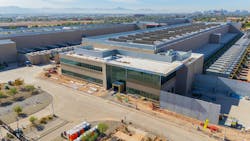Data center industry at a crossroads: Soaring demand meets critical constraints
The data center industry is booming, but power shortages, talent gaps, tariffs and community pressures stand in the shadow of the sector’s meteoric rise. Top industry experts gathered in Nashville at JLL’s annual Data Center Forum to discuss these pressing themes facing the rapidly growing industry and explore strategies to steer through challenges while identifying opportunities.
“The data center industry is at a critical juncture, facing unprecedented demand alongside significant challenges in power and land scarcity, workforce development and sustainability requirements,” said Matt Landek, Division President, U.S. Data Center Work Dynamics and JLL’s Data Center Project Development and Services Lead. “The goal of JLL’s annual Data Center Forum is to highlight the need for innovative solutions and facilitate increased collaboration across the industry to address these important issues.”
The five key themes that emerged from a packed schedule of panel discussions throughout the event are: unprecedented demand growth and capital markets interest; the impact of tariffs; power constraints and artificial intelligence’s (AI) effect on infrastructure; talent gaps and workforce challenges; and sustainability and community relations.
Extraordinary demand attracts record capital despite risks
Driven by AI adoption and increasing data usage across sectors, the industry is experiencing record levels of demand, with expectations of doubling all data center capacity within the next five years. There is also a shift in what projects are considered large—from 20 MW a few years ago to 100 MW+ transactions now becoming more common.
Between 7 and 10 gigawatts are expected to be absorbed this year, though some experts expressed slight concerns about AI assumptions and potential hyperscaler leasing slowdowns in 2025. Companies are now starting to speculatively buy and develop onsite generation due to lead time issues with grid delivery.
Strong investor interest continues despite some increased risk perception.
“There is a record setting number of data center developments under construction, which is driving the need for more creative debt and equity solutions,” said Carl Beardsley, Senior Managing Director, Data Center Leader, JLL Capital Markets. “Data Center REITs have outperformed all other real estate asset classes since the tariffs were announced, and the debt markets remain liquid despite some macro volatility. There are also more investors coming into the data center sector, as development deals are requiring heavier capital commitments earlier on in the process based on new utility procurement processes.”
New trade policies are reshaping data center economics
Tariffs have become a topic of concern in the data center industry recently. While their full impact is not yet clear, there is caution around potential price increases and procurement delays for critical equipment. Many data center projects have already ordered equipment pre-tariff, so the effects may not be immediately apparent; however, some industry experts expect that when existing inventory is depleted—possibly as soon as late May—the impact of tariffs on construction pricing might become more evident.
Despite the uncertainties, the experts noted that demand for data center capacity appears to be relatively inelastic, meaning that the potential for increased costs due to tariffs has had a limited impact on leasing activity. There have not been major overnight price increases or significant procurement delays reported; however, the situation is being closely monitored.
“Some companies are pausing to reassess their financial models and underwriting assumptions for development in light of potential tariff impacts, but we are unaware of any projects that have been canceled due to tariffs,” said Andrew Batson, Head of U.S. Data Center Research for JLL. “In general, developers are communicating that tariffs may result in a modest 5% increase in construction costs. Overall, while tariffs are a concern, they do not seem to be dramatically disrupting data center development plans at this stage.”
Power crunch looms as data centers race to keep up with AI boom
Power availability has become a major bottleneck for data center development, with extended timelines for power delivery averaging four years across markets, as reported in JLL’s North America Data Center Year-End 2024 Report. The rise of AI is driving dramatic increases in power density requirements, with some cabinets now requiring 100-600 kW of power. This is necessitating a shift toward liquid cooling and other new cooling technologies to handle higher densities.
“Utilities cannot keep up with the volume of requests for power studies and interconnections,” said Andy Cvengros, Executive Managing Director, Co-Lead of U.S. Data Center Markets, JLL. “The industry is exploring alternative power solutions like on-site generation, small modular nuclear reactors (SMRs) and renewable energy to address these constraints. Additionally, developers are facing additional challenges in long-term planning due to rapidly evolving AI hardware requirements.”
Panelists did discuss the popularity of “shell cabinets” or “plug and play” approaches, where the network infrastructure is deployed first before rolling in the cabinets/racks. This allows for faster deployment times and improved stability.
Energy optimization and community relations take center stage
Sustainability and improving energy efficiency are key focuses for the data center industry, with companies increasingly looking to incorporate environmentally friendly practices and renewable energy sources. Nuclear power, particularly SMRs, are a potential 24/7 clean energy source for data centers, along with other sustainable solutions like solar, wind, and battery storage, all of which are playing an increasingly significant role. The industry recognizes the need for an “all-of-the-above” approach to meet growing power demands while also addressing sustainability goals.
Community relations emerged as an important topic, with several speakers highlighting the need for data center operators to better engage with and educate local communities. Data centers can face resistance from residents concerned about issues like noise, electromagnetic radiation or industrial development in rural areas. Overall, the industry recognizes the need to work closely with local stakeholders and community leaders to help the community understand the positive impacts of data center development, including high-paying jobs and infrastructure improvements.
“Society-at-large is driving the demand for more data centers while the industry is under increased pressure to address sustainability issues, balance rapid growth with environmental responsibility and facing growing community resistance in some areas,” said Sean Farney, VP Data Center Strategy at JLL, and the event’s emcee. “JLL Research shows that the global CAGR for new data creation is 24%, driven by our voracious appetite for streaming, social media and countless apps that run our households, workplaces and lives. This amazing growth indicates that the Fifth Industrial Revolution—where technology has fused with culture—is here. At JLL, our mission is to shape the future of real estate for a better world, so it’s also our responsibility as stewards of both the environment and communities in which we operate to properly manage the perception of rapid data center growth as both a benefit to and requirement for 21st-century culture.”
Talent wars heat up
There is significant concern in the data center industry about talent shortages and workforce challenges. Panelists noted the industry is growing faster than the available talent pool, creating a significant skills shortage, especially as data center roles evolve. For example, as equipment becomes more reliable, there’s less need for hands-on repair work, so jobs are changing.
Some companies are looking to retrain existing staff and broaden their roles, such as having data center engineers also work on projects. Others are exploring hiring from adjacent industries like oil and gas that have similar mission-critical environments and transferable skills. Additionally, as the industry adopts liquid cooling as the standard, data center experts anticipate a shift from an electrician-based to more a plumbing-based workforce.
There is a growing focus on employee experience, career development and attracting talent from non-traditional sources to address this gap. Overall, attracting and retaining talent remains a key challenge as the industry grows rapidly.
The JLL Data Center forum highlighted the need for creative solutions across power generation, infrastructure development and regulatory frameworks.
“With demand expected to outpace current capacity, stakeholders must work together to address critical issues like power availability, workforce development and sustainability,” Landek added. “As the sector continues its rapid expansion, adaptability and forward-thinking strategies will be crucial for managing the complex world of data center development and operations.”
Your data has never been more critical, and neither has your data center partner. From colocation site selection and land acquisition and disposition to divestment, facilities management and energy procurement, JLL’s team of dedicated technical experts are trained and experienced in every phase of the data center lifecycle to help you scale, optimize and maintain efficiencies in your data center strategy. Our solutions enable your business to make higher-quality decisions and enter new markets with reduced friction through local market expertise, business intelligence, proprietary data and cutting-edge technology tools. To learn more, visit jll.com/en-us/industries/data-centers.
For more news, videos and research resources on JLL, please visit JLL’s newsroom.
About JLL
For over 200 years, JLL (NYSE: JLL), a leading global commercial real estate and investment management company, has helped clients buy, build, occupy, manage and invest in a variety of commercial, industrial, hotel, residential and retail properties. A Fortune 500® company with annual revenue of $23.4 billion and operations in over 80 countries around the world, our more than 112,000 employees bring the power of a global platform combined with local expertise. Driven by our purpose to shape the future of real estate for a better world, we help our clients, people and communities SEE A BRIGHTER WAYSM. JLL is the brand name, and a registered trademark, of Jones Lang LaSalle Incorporated. For further information, visit jll.com.

